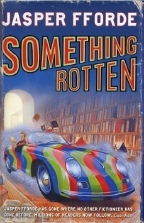 |
 Jasper Fforde
Jasper Fforde
Something Rotten
Reviewed by: Rick Kleffel © 2005
Hodder & Stoughton / Hodder Headline
UK First Edition Trade
ISBN 0-340-83558-3
Publication Date: 05-06-2004
400 Pages; £12.99
Date Reviewed: 07-20-05
Penguin
US Trade Paperback
ISBN 0-14303-541-X
Publication Date: 07-26-2005
416 Pages; $14.00
Date Reviewed: 07-20-05
Index:
Science Fiction
Mystery
General Fiction
Everyone has to live in the real world -- unless you're Thursday Next, Jasper Fforde's Literary Detective. In Fforde's unique world, people can step in and out of books and literally live in fictional worlds, from 'Hamlet' to 'Death at Double-X Ranch'. In 'Something Rotten', Fforde returns to Thursday's world of living books to find his heroine taking refuge in literature. Thursday is living in a novel, bring up her son Friday and running Jurisfiction, the law-and-order bureaucracy that keeps books internally consistent, ensuring that characters from one work don’t escape and cause havoc in another. Circumstances conspire to force Thursday to return to her real world, such as it is, to find her husband. But reality isn’t what it used to be, even for Thursday Next. Once simply a fascinating background for Fforde's inspired imagination, a world where literature lives and breathes and dominates culture, Thursday's real world is being sullied by imagination's most fierce enemy -- politics.
Fforde's fourth outing is every bit as fresh as the first three, and it's something more as well. 'Something Rotten' adds layers of political satire. Yes, it's outrageously funny, with jokes coming thick and fast, but Fforde aims his considerable intellect and wit at lying politicians who happen to be whipping up a campaign of fear and hatred to start a war against Denmark. The miracle here is that Fforde can keep his light touch and use a slim saber to stab deep. The key to his ability to make his satire sharp and effective is characters we care about.
Upon returning to the real world, Thursday finds that in her absence, she's been accused of cheese smuggling and is force to struggle to get her old job back. She's plummeted from the top of the heap in fiction to the bottom of barrel in reality. Escaping fiction with her is Hamlet, and in the Dane-hating England to which she returns, he's more than a brooding burden. Once again, events are focused on a convenient apocalypse, and Thursday must sort them out to find her husband and save the world.
'Something Rotten', with its political subtext, is really a rather ambitious work. Fforde focuses on the power of the media to manipulate the masses, an appropriate target for a society steeped in literature. His obvious intelligence and his deep understanding of how literature and fiction shape our perceptions enable him to dig deep into political machinations with jokes that make you laugh out loud while they flay the flesh from the sacred cows who want us to live in fear. But while he's clearly writing about current events, he does so at such distance that he never seems overly topical. When politics there take a turn for the worse, it's no surprise. 'Something Rotten' gets to the universal core of why we're so happily manipulated, and that core is well, rotten.
Taking us on the journey are Thursday, Hamlet, and Thursday's family. As ever, 'Something Rotten' is filled with wonderful details that both bring the characters alive and a cracking good jokes. Her two-year old son Friday, for example, having been brought up in the world of fiction, speaks in Lorem Ipsum, the Latin-sounding dummy text used by typesetters to demonstrate layout. Fforde provides some very satisfying character arcs for Thursday, her family and Hamlet.
Hamlet is -- not surprisingly -- a wonderful, standout character. Fforde sends him to therapy, arms him and gives him a worthy adversary, Yorick Kaine. Fforde's nuanced, perceptive hand allows Hamlet to grow far beyond satire and beyond the play from which he originates. Obviously but not showily well-researched, Hamlet demonstrates this author's penchant for characterization that underlies the barrage of in-jokes and literary references. Those jokes are funny and references trenchant because we like and believe in the characters who are living amidst them.
'Something Rotten' gets a boost from nice production, with illustrations and advertisements interspersed within the narrative. It does really require that readers have read the preceding novels, in order of their appearance. If you start with 'Something Rotten', while you may enjoy the jokes and the surface matters, it's likely that's all you'll enjoy, and if that's all you enjoy even Fforde's abundant wit will wear thin. The key to Fforde's success is the assured, entertaining voice of Thursday Next, drawing you not only into her world but her life. Resolution is at hand. 'Something Rotten' is exposed and the truth conquers all. Love conquers all, or at least, is given a chance to get on with its business. In Fforde's world, as in ours, truth is stranger than fiction, but fiction has the power to expose the truth.
|
 |
